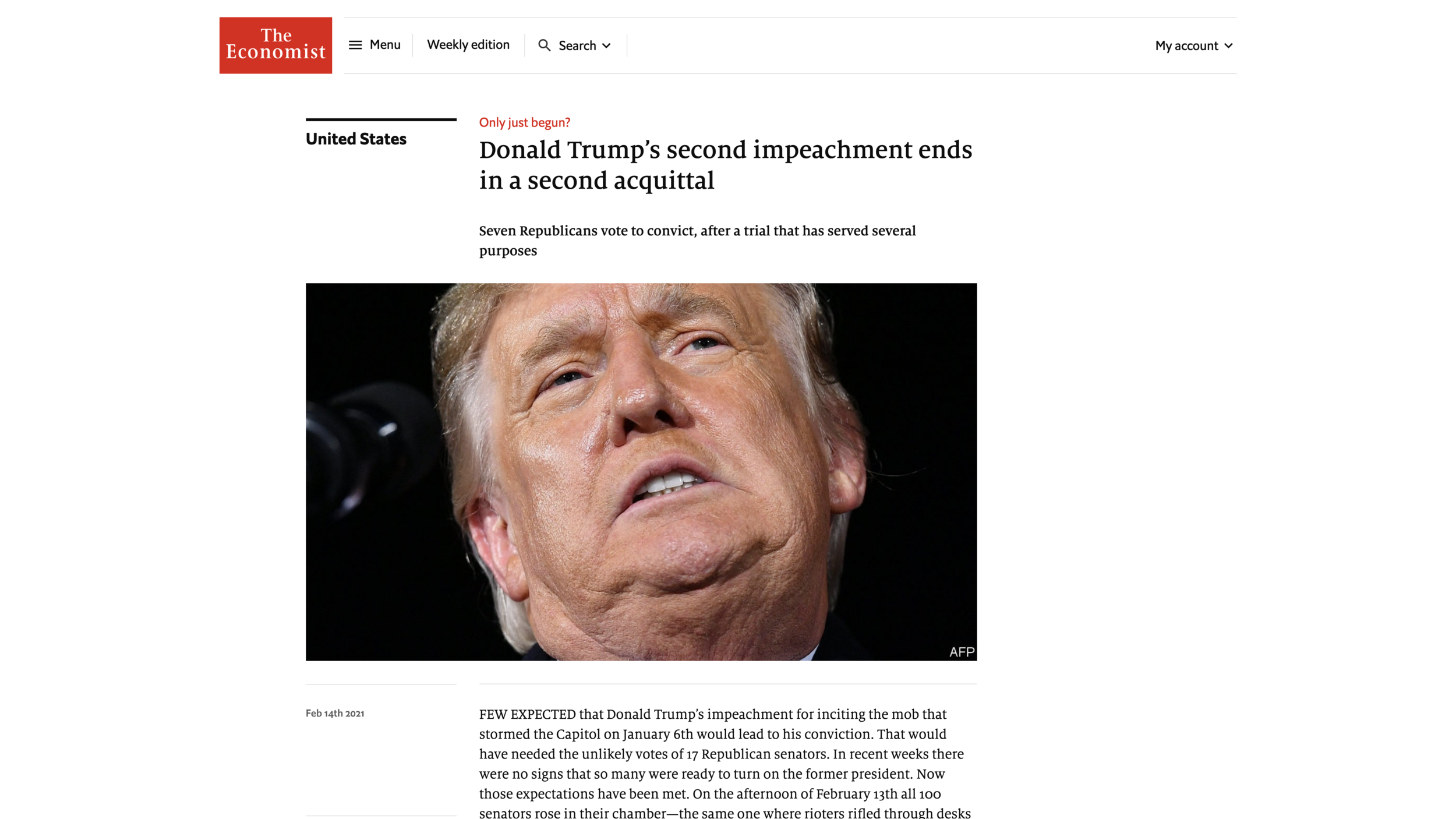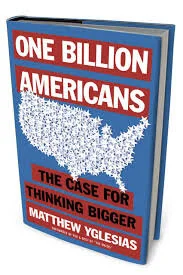The Economist: 7 Republican Votes to Convict Donald Trump is a Big Deal
I am a glass-half-full person. (I wasn’t always so; see “How I Became Optimistic” and “Five Books That Have Changed My Life.” In the case of the Senate’s failure to convict Donald Trump after his second impeachment, I find the Economist agreeing with me in a glass-half-full take. (How I would have voted if I were a senator is clear from “The Federalist Papers #22 C: Pillars of Democracy—The Judicial System, Military Loyal to the Constitution, and Police Loyal to the Constitution” and “Peggy Noonan: Bring the Insurrectionists to Justice.”)
The February 14, 2021 Economist op-ed “Donald Trump’s second impeachment ends in a second acquittal” (from which all quotations in this post are taken) begins by explaining why low expectations for conviction were warranted:
Few expected that Donald Trump’s impeachment for inciting the mob that stormed the Capitol on January 6th would lead to his conviction. That would have needed the unlikely votes of 17 Republican senators.
Party loyalty is strong, and there is enough affection for Donald Trump left in the Republican primary electorate that many Republican senators would worry about losing in the next primary election they face if they voted to convict Donald.
Moreover, historically it has been difficult to same-party votes to convict a president or former president:
That seven senators turned against a still popular former president from their own party is striking. It was a different story last year, when Mr Trump was impeached for abuse of office after he put pressure on Ukraine’s government to investigate his main political opponent, Joe Biden, now president. On that occasion, Mitt Romney was the only Republican senator ready to vote to convict him. (That, in turn, was the first time any senator had voted against a president from his own party in an impeachment trial).
To those seven senators can be added one more who voted to acquit, but had remarkably sharply-worded criticism for a same-party ex-president:
On January 19th a visibly angry Mr McConnell had told the Senate of how “the mob was fed lies” and was “provoked by the president and other powerful people”. On February 13th, following the acquittal, Mr McConnell repeated that “there is no question, none, that President Trump is practically and morally responsible for provoking” the rioters’ attack. Mr McConnell, however, voted “not guilty”, arguing that the Senate lacked jurisdiction to punish Mr Trump once he had left office. He dropped strong hints that others might yet prosecute the ex-president, saying: “We have a criminal-justice system in this country. We have civil litigation. And former presidents are not immune from being accountable by either one.”
Nikki Haley also had sharp words for Trump:
To the number of senior Republicans turning their backs on Mr Trump may be added Nikki Haley, a former ambassador to the United Nations, who in an interview published on Friday said she was “disgusted” by his treatment of his vice-president, Mike Pence, and suggested he had “no future” in the party.
“Donald Trump’s second impeachment ends in a second acquittal” also directly addressed the question “Did the failure to convict Mr Trump mean it was a mistake to try?” It argues no. First, there wasn’t much choice but to try:
Not trying him for “high crimes and misdemeanours”, would have been to overlook egregious misbehaviour.
Second, the trial helped convince the public to take Donald’s offenses seriously:
The Senate trial drew avid public attention. Dramatic fresh footage of the assault by the mob, presented this week by Democratic congressmen serving as the prosecution, was witnessed by millions of Americans following events online and on television.
Third, the objective of trying to get an acquittal led Donald’s lawyers to concede important points:
Even Mr Trump’s lawyers frankly condemned the assault on the Capitol as “horrific” and said it was conducted by criminals. Whatever the result, the trial may thus have gone some way to helping to draw a line against antidemocratic violence—as low a bar as that might seem.
To these points by the Economist, I’ll add a fourth by Noah Smith: in Donald’s last days as a lame duck worrying about impeachment helped keep Donald occupied and possibly distracted him from other mischief he might have done as part of his endgame as president.
We certainly could have wished for a more decisive outcome, but it is an imperfect world. I am grateful that under serious strain from Donald’s antidemocratic behavior, the system held, and has delivered some rebuke to him. I say this despite how much he pretends to have won the election and despite how much he proclaims victory from the fact that only 57 senators voted to convict rather than 67.
Going forward, it matters a lot for what becomes of the Republican Party whether the bulk of the Republican Party continues to honor Donald or whether or not in the next two elections they begin to distance themselves from Donald, both rhetorically in 2022 and perhaps by voting against him in the primaries leading up to 2024.
Let me share my even more optimistic spin on Donald Trump’s time as our president (a spin that could easily be wrong). It just may have been worth it if, in the long run, Donald Trump tars being anti-immigrant as the despicable thing that it is in the eyes of a solid majority of the electorate. On my views on immigration, see “It Isn't OK to Be Anti-Immigrant” and “‘The Hunger Games’ Is Hardly Our Future--It's Already Here.” And on the geopolitical danger of becoming #2 in the world if we don’t allow more immigration, see “Benjamin Franklin's Strategy to Make the US a Superpower Worked Once, Why Not Try It Again?” and Matthew Yglesias’s book One Billion Americans.

